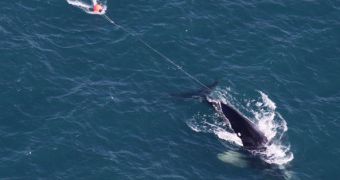Pretty much everybody knows that fishing gear kills whales. Still, not many are all that familiar with how it is exactly that fishing lines impact on these marine mammals' lives, ultimately causing them to die.
On May 21, the Woods Hole Oceanographic Institution published a study documenting how a whale's behavior changes once the animal gets entangled in fishing lines.
The findings of this research are based on information collected while closely monitoring a whale dubbed Eg 3911.
This North Atlantic right whale was born in 2009, and was first spotted all wrapped up in fishing gear in December 2012.
At that time, the fishing gear covered the animal's mouth, its pectoral fins and also trailed roughly 100 feet (roughly 30.5 meters) behind it.
As the researchers explain, this marine mammal was kept a close eye on both before and during its coming to drag several pounds of fishing gear behind it.
Part of the monitoring was carried out with the help of a cellphone-size device referred to as a Dtag, which made it possible for the researchers to analyze the marine mammal's feeding and swimming behavior.
As explained on the official website for the Woods Hole Oceanographic Institution, the fishing gear caused the whale to swim at a slower pace than it normally would have, and it also impeded its ability to dive in search for food.
The specialists also say that the extra weight that EG 3911 was forced to carry depleted the animal of its energy.
“Together, the effects of added buoyancy, added drag, and reduced swimming speed due to towing accessory gear pose many threats to entangled whales. Most significant, however, is the energy drain associated with added drag,” the researchers say.
In January 2011, a team of specialists managed to sedate the whale and remove some of the fishing gear wrapped around its body.
“The whale altered its behavior immediately following disentanglement. The near-complete disentanglement of Eg 3911 resulted in significant increases in dive duration and depth,” the rescuers reported.
More precisely, the marine mammal started swimming faster, dove twice as deep and even started spending more time below the water's surface.
Despite it's being partly freed, the North Atlantic right whale passed away in February 2011.
Investigations carried out after the whale's carcass had been found revealed that the marine mammal died as a result of its spending a tad too much time entangled in the fishing gear.

 14 DAY TRIAL //
14 DAY TRIAL //